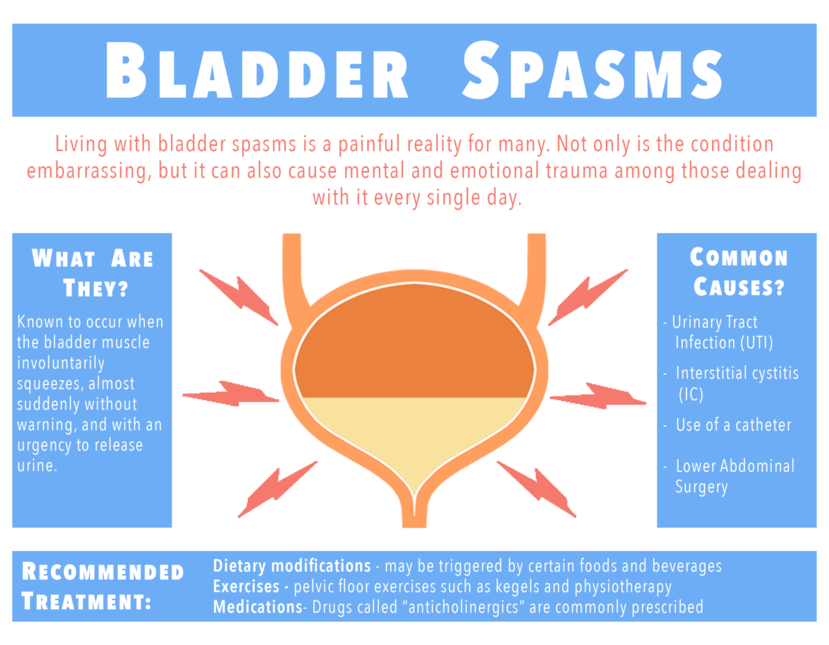Bladder Spasms: Understanding the Condition and Treatment Options
Bladder spasms are a common urinary tract condition that causes sudden, involuntary contractions of the bladder muscles. This can result in a strong urge to urinate and be quite uncomfortable. Bladder spasms can be caused by various factors, including urinary tract infections, bladder infections, bladder stones, or nerve damage.
In this article, we will explore the symptoms, causes, and treatment options for bladder spasms, as well as answer some frequently asked questions.

Symptoms of Bladder Spasms
The primary symptom of bladder spasms is a sudden, uncontrollable urge to urinate. Other common symptoms include:
- Frequent urination
- Painful urination
- A feeling of pressure or fullness in the bladder
- Inability to empty the bladder completely
- Pain or discomfort in the lower abdomen or pelvis
Causes of Bladder Spasms
Bladder spasms can be caused by a variety of factors, including:
- Urinary tract infections
- Bladder infections
- Bladder stones
- Nerve damage
- Spinal cord injuries
- Certain medications, such as diuretics
- Bladder cancer
Treatment Options for Bladder Spasms
The treatment for bladder spasms depends on the underlying cause. Some common treatment options include:
- Medications: Medications such as anticholinergics, muscle relaxants, and tricyclic antidepressants can help relax the bladder muscles and reduce bladder spasms.
- Bladder training: Bladder training involves gradually increasing the time between urinations to help retrain the bladder muscles to hold more urine.
- Catheterization: In some cases, a catheter may be necessary to help drain the bladder and reduce spasms.
- Surgery: In rare cases, surgery may be necessary to correct an underlying condition that is causing bladder spasms.
Frequently Asked Questions
Q: Can bladder spasms be caused by a urinary tract infection (UTI)?
A: Yes, bladder spasms can be caused by a UTI. Bladder spasms are a common symptom of a UTI.
Q: Can over-the-counter medications help with bladder spasms?
A: There are some over-the-counter medications, such as phenazopyridine, that can help reduce pain and discomfort associated with bladder spasms. However, it’s important to talk to your doctor before taking any medications.
Q: Are bladder spasms common during pregnancy?
A: Yes, bladder spasms are common during pregnancy. This is because the growing fetus puts pressure on the bladder, which can lead to spasms.
Q: Can bladder spasms be prevented?
A: In some cases, bladder spasms can be prevented by maintaining good bladder health, staying hydrated, and avoiding irritants like caffeine, alcohol, and spicy foods.
Q: Are there any natural remedies for bladder spasms?
A: Some people find relief from bladder spasms by using natural remedies such as pelvic floor exercises, yoga, and herbal supplements like cranberry extract and saw palmetto. However, it’s important to talk to your doctor before trying any natural remedies as they may interact with other medications you are taking.
Q: Can bladder spasms be a sign of bladder cancer?
A: Bladder spasms can be a symptom of bladder cancer, but they can also be caused by other conditions. It’s important to talk to your doctor if you are experiencing symptoms of bladder spasms to determine the underlying cause.
Q: Can bladder spasms be caused by a urinary tract infection (UTI)?
A: Yes, bladder spasms can be caused by a UTI. Bladder spasms are a common symptom of a UTI.
Q: Can over-the-counter medications help with bladder spasms?
A: There are some over-the-counter medications, such as phenazopyridine, that can help reduce pain and discomfort associated with bladder spasms. However, it’s important to talk to your doctor before taking any medications.
Q: Are bladder spasms common during pregnancy?
A: Yes, bladder spasms are common during pregnancy. This is because the growing fetus puts pressure on the bladder, which can lead to spasms.
Q: Can bladder spasms be prevented?
A: In some cases, bladder spasms can be prevented by maintaining good bladder health, staying hydrated, and avoiding irritants like caffeine, alcohol, and spicy foods.
In conclusion, bladder spasms can be painful and uncomfortable conditions, but with proper diagnosis and treatment, they can be managed effectively. If you are experiencing symptoms of bladder spasms, it’s important to talk to your doctor to determine the underlying cause and appropriate treatment options. In addition, making lifestyle changes such as maintaining good bladder health and avoiding bladder irritants may help prevent bladder spasms from occurring.




